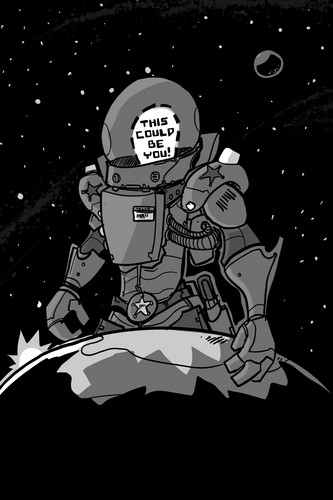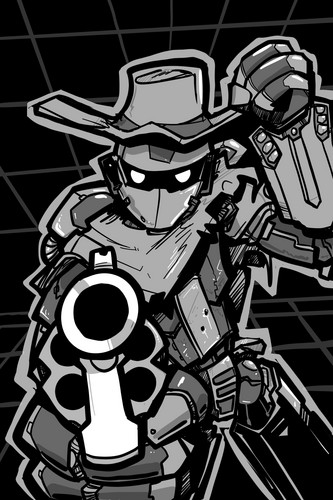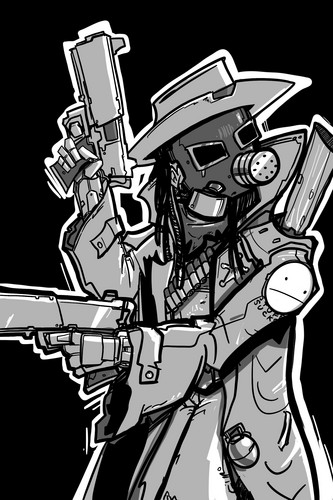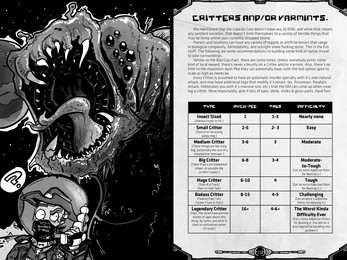
Lawman RPG
A downloadable game
Lawman is a tabletop roleplaying game set in the far distant future year of AC 20406 (Nobody remembers what the AC stands for, nor does it really matter.) in the explored Galactic Core of Space.
Old Urf, as it was known, and its originating systems have been lost to time, and now, pretty much everybody carries on like it never really existed, nor does it really matter at this point.
The descendants of humanity as we once knew it rose to near-transcendent heights of success, achieving wonders and things that we couldn't even begin to theorize throughout our millennia of existence - only to get ridiculously bored with our god-slaying scientific endeavors, and eventually fall into the pratfalls of another pseudo-dark age. (Who knew?)
When science and nerdy stuff fails, people regress back to the simpler, primal behaviors, such as 'being dumb' and 'often doin' crimes.' Such as the situation 20 years ago, when the last vestiges of idyllic utopian living were completely steamrolled to the sound of uneducated slobs fucking up the works for the rest of society.
As the looting and bedlam rage on, the local police forces, wracked with their own corruption and/or hopelessly outnumbered and outgunned, are nearly powerless to affect the situation at large. Things are bad.
Fortunately, corporate interests have our back, once again, good common folk. The Sirius Hypercorporation has invested a good share of last year's profits into an excellent marketing and branding campaign and has created a freelance bounty hunter program called LAWMAN. (You've seen the commercials.)
Willing to hire literally almost anybody off the streets (with a comprehensive background and psychological screening, of course) to be employed as a badge-toting, no-nonsense takin' son of a gun ready to operate as an independently liable, semi-competent, part-time crime enforcement officer.
Think of a (trademarked business of instant food delivery service) driver, except they've been given the authority to arrest perps.
When you're a LAWMAN, you get your own ship (registered privately under the company to you, Gud help you if you lose it.), your own team to work with, and an infinite list of baddies worth tracking down through all five sectors of the Galactic Core, each with a hefty price on their head for their malicious crimes. Not to mention the requisite paperwork to cross interstellar lines and get away with nearly anything you need to do in order to capture your quarry and bring them back to a hoosegow.
Things are pretty good, as long as you maintain employment, that is. Otherwise, that friendly crew of yours might stand to make a buck off you while you sleep. Or worse.
In short, Lawman exists to give players access to an easy to construct, overconfident badass with zero sense of impostor syndrome as you explore the cosmos, looking to break noses, bust kneecaps, crack ribs, fracture skulls, scream obscenities (and receive), and haul in riff-raff for the proverbial fat stack of cash-money that everybody needs for bills and luxuries and whatnot.
And if that doesn't happen, the worst thing that can happen is a multitude of grisly, grotesque, awful ways to get killed on the soil of backwater worlds or in the fringes of deep space.
---
Lawman was inspired by some of the following things, and if you also like these things, you'll probably enjoy this game:
- Cowboy Bebop. (because it's great without saying any more.)
- Trigun. (because it's great without saying any more. )
- Outlaw Star. (because it's great without saying any more. )
- Borderlands. (one at the time, although TWO really came and improved on it, and I'm not ready to talk about my feelings on three, yet.)
- Firefly. (because people still enjoy a single season of incomplete television twenty years later and for good reasons.)
- Robocop. (for ultraviolence and the seething 80s satire.)
- Judge Dredd. (Comics. and 2012. Same as above, and we're gonna ignore the Stallone movie for the most part.)
- Idiocracy. (yes, gets thrown around a lot, but it's probably the direction we're going as a society and a perfect representation of the humor. President Camacho is the perfect example of a Lawman character.)
- and an old parody RPG that five of you may remember called HōL from Black Dog Games. (Mostly for the humor and style.)
| Status | Released |
| Category | Physical game |
| Rating | Rated 5.0 out of 5 stars (1 total ratings) |
| Author | Internet Famous Joe Martin |
| Genre | Adventure, Role Playing |
| Tags | Action RPG, Dark Humor, goofy, pen-and-paper, Sci-fi, Space, space-cowboy, Tabletop |
Purchase
In order to download this game you must purchase it at or above the minimum price of $4.95 USD. You will get access to the following files:
"Yeah, dude, I’d like to. But I’m broke."
Support this game at or above a special price point to receive something exclusive.
"Yeah, dude, I’d like to. But I’m broke."
The community copies of Lawman are produced for everybody who’d like to check the game out, but are going through some stuff, or just can’t spend cash on the game, but wanna check it out.
For every copy of the game that sells on here, I will add one community copy for someone else to check out - like a pay it forward kind of deal.
So please. Take it if you absolutely need it (and you know who you are), like it, please review it, and have fun.





Comments
Log in with itch.io to leave a comment.
Any news on the physical cards and deliverables from the Kickstarter campaign that funded this? Perhaps an update due for the folks over there on this? TIA.
Also wondering this.
Am I missing the page that describe how investigation actually works in the game? I see in the flow chart : "YOU SEARCH, ASK AROUND, FIND CLUES, AND INVESTIGATE, OR STUMBLE INTO USEFUL INFORMATION OR ANOTHER ENCOUNTER."
But there is no GM Guidance on running this investigation like there is for combat.
You know. Great advice. I think part of me wrote this while assuming that this would be part of the standard storytelling standard that is akin with TTRPG and maybe i didn't think to explain it very well.
I'm thinking of a way to write some addendum pages and include it with this for somebody who might be looking for this experience.
A lot of this assumed it would be done with generating tasks that the DM would give a difficulty rating based on complexity through storytelling,
ex. "Hansen arrived on Spacedock 447-b and started asking around for the whereabouts of Muldoon. Since he's not sure where to start, it would be a tough check, unless Hansen could tell me a reason why he might actually have some clues or leads to change this difficulty to a normal, possibly easy check."
But i can see about clarifying it with further detail. I've been looking at writing additional mechanics, and maybe it wouldn't be bad to further flesh that out.
I'm sorry for the lack of clarity on this in the book. And thanks for the advice and insight. It's appreciated. :)
I appreciate the response! Investigations are some of the toughest things to run smoothly in a TTRPG. Many games either go very simulationist where the DM has to set up many clues (because PCs will miss them) and have an established Revelation List to learn various aspects. Then you need all these plans to allow for what happens when the PCs still miss clues. Or the games go for very abstract ways where PCs may need to fill in a clock or they collect currencies for gathering information allowing you to better improv what is learned based on what the PC does. Brindlewood Bay does a little bit of both and it provides a generic list of clues that could be placed almost anywhere with some creativity.
The good thing about Bounty Hunting is that you don't need to do too much so its easier to give leads to a location no matter where PCs decide to look. Its easy to focus on the chase or sometimes even collecting the bounty is the tough part as complications arise.
I've been thinking about this a lot since your initial comment and am trying to think of a system for it and attaching it to the bundle as extended information.
I don't know if this is a situation that requires some extended skill challenges to do that setup, or something, but you're presenting a lot of interesting information that i'd like to try out and write a proper system for, for anything else to give you a concrete system of doing it.
I picked up the Blade Runner TTRPG, and while i haven't gotten it to the table, i know one of it's negative remarks is that the investigation system isn't as robust or functional as expected. While i can't verify that (yet) i find it interesting that something that seemingly should have been a slam dunk, well, wasn't. And this puts me in an interesting school of thought to explore this and make something.
Will love to make something that i hope will work well with what you want or hope to get from it. :)
That is a shame to see from Free League. I know Vaesen is on my list to help me run better investigations along with Call of Cthulhu and Monster of the Week. And as a sci fi nerd, I want to see Blade Runner too with having some nice brooding PCs. And now you're going to make me want to read what you come up with!
But seriously I love that you replied and look forward to seeing what you make.
I just ran an Avatar Legends adventure "Water & Mist" where the Players have to find someone and they are presented with an 8-segment clock out of character to represent time pressure. If they couldn't come up with ideas, they could always take time (and Fatigue) to investigate and get a lead. But they generally did a good enough job getting information from people and find clues that it wasn't needed. Just a cool idea as a fallback and a way to abstract investigating a large area for clues. And though the players didn't know, if the clock fills, the kidnapped victim gets blown up. As a nice positive game loop, when the clock gains 2 segments, the PCs get another event that they can use for more clues.
But the setup looked complex with a lot of clues, NPCs, Locations and interconnections between them all. I think a lot of Gumshoe games work similarly.
I wrote this as sort of an assembly cut to this idea (before i saw you responded with the Avatar clock, a system that i actually JUST picked up, actually), and wanted to know what you thought of it in concept. I'd like to fine tune it with something you want, and when i get around to doing a 2nd edition, would love to pen you as an inspiration for making this addition happen.
Let me know what you think. Like i said. This was sort of a tangental approach, but i was sort of thinking about, well, the board game Android as a source for it, since i sort of enjoyed it's abstract approach for it, as well as bits of, well, honestly some Shadowrun 3rd. (gulp.)
---
Investigation Mechanic: (an idea at this point.)
A series of extended tests simulating active searching to find information about your suspect.
You can do a test of uninterrupted, undistracted activity (handled as three hours of in-game time activity). If something else happens, the test is interrupted, and the players will have to start over, meaning the test is a failure and no leads are generated.
Tests start at a base difficulty of tough (5 or under), and can be improved by DM approved tags to make it an easier roll.
Roll a d20, beat the check, and see the results.
Successful tests earn one lead.
Critical successes earn five leads.
(Adjective) points can be spent on a success to increase the number of leads by +2 per point. If no success is rolled, you can spend one (Adjective) point to get at least one lead, anyway. However, A DM can expend a Fuck You point to negate (Adjective) points spent for this check.
Critical failures will remove all earned leads and the players will have to start over from scratch, with the DM telling some kind of story about this information being a dead end or a red herring or the Lawman needing to get it together because this is going nowhere.
Leads are typically rolled by one player amongst the group to simulate the active group, but if the group insists on pooling it’s resources, consider their shared efforts to generate three leads for a success and ten for a critical success.
Leads are basically defined as digital fingerprints, known hangouts, associates, and information that can generally be pooled by database to assess where this individual is.
The DM (secretly) determines the number of leads that are required to unveil some key point of information relevant to tracking down their suspect. The information can be as direct as their exact whereabouts, or a good idea to their regular hangouts or activities.
Example difficulties based on your scumbag perp:
Idiot Criminal Dum-Dums, (if not out in the open as it is, which means that they’re one lead away from being caught) might be 3 to 7 leads to locate.
Actual Criminal Professionals may require 8-12.
And people that KNOW how not to get caught might be a minimum of ten, with no maximum capacity. It’s the DM’s determination.
Once the information has been gathered, the players may choose as an action to explore their gathered leads, which is the activity of pooling it all together to create an active storytelling path to hunt the criminal down. If they have enough leads to meet or exceed the DM’s target number, they will unlock some crucial and critical piece of information that might lead them towards their target.
If they do choose to explore their leads and they don’t have enough to meet or exceed the DM’s target, storytell a situation here they go out, hit the streets and spaceways, ask around, and come up with nothing. (The DM can also introduce something else story wise to interrupt their search, say, an unforeseen shakedown by allies of the suspect, or some situation that needs to be addressed.) Unless something drastically affecting the storytelling occurs - they don’t lose the leads for trying - They just come up empty for the moment, and more work will need to be done or something will come up to address the shortfall.
Leads generated only apply to the individual they are searching for, and once they encounter them and capture them (or not), they are considered spent. If the suspect gets away, you will have to begin the search again. (at a much higher DM determined difficulty rating.)
Leads for a suspect are for that suspect only and will not carry to hunting down another suspect. Those leads stay with the target.
---
Let me know what you think! The numbers might be fudged. I haven't playtested it yet, but it's pretty much just an abstract information commodity versus target system. I'm trying to think of ways to make it a little more spicier.
An “investigations addendum” PDF would be super cool on this.